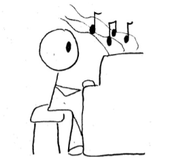Part of our role as teachers is to educate parents so that they can be involved as partners and coaches. If you are reading this blog, feel free to share it with your students’ parents to encourage them to be vigilant about their role in encouraging efficient practice at home. Students can easily fool themselves as well as their parents into thinking they are doing what they are supposed to be doing. Much time is wasted when this happens. Even if parents are not musicians, they can still be very effective “practice detectives.”
Below, I’ve listed my top 10 practice concerns along with some suggestions for helping students to use their practice time more efficiently.
- We think we can be successful without a steady practice regimen.
One week away from practice causes regression. It is a fact that we must have continuous, steady practice in order to get our pieces polished and into long-term memory. Parents often ask me how long should Johnny practice? There is no one answer because it depends on the individual student and the level. Here’s a great article to reference on this topic, http://pianoteachersfederation.org/how-much-practice-is-required-to-learn-piano-at-different-levels - We overlook our focus on proper sitting and avoid working on technique.
Technique is the foundation for success. Like the foundation of a home, it must be solid and strong, and it starts with correct alignment and posture at the piano. Proper hand positions, sitting at a correct distance and height from the keyboard, and having both feet on the floor are fundamentals for success. We avoid practicing scales, chords, and arpeggios, but snippets of these appear in every piece of repertoire. I suggest starting the first 5-minutes of every practice session with focus on technique. It serves as a warm-up, and students can make it more interesting by playing with different touches, rhythms, and/or tempos. - We avoid attention to details such as key, form, and structure.
These are the building blocks in the tapestry of the music, and without them the music would not exist! They are an integral part of the music and must be discovered as an initial step before learning a piece. - We are reluctant to count and use a metronome.
We rush to play pieces with a reluctance to count and/or use a metronome because we don’t think it is necessary. The metronome and counting out loud are parts of the learning process that accelerate understanding and advancement. Students who refuse to use these tools fall behind in grasping rhythm which is an indispensable element of music. - We avoid working hands separately.
We just want to dive in and play a new piece with our hands together. The problem in doing this is that it requires interhemispheric communication in the brain. The left side of the brain controls the right hand, and the right side controls the left hand. Hand and finger independence are crucial for building the ability to play hands together. Each part should be mastered individually as a foundation for putting the hands together. - We mindlessly follow the notes on the page, and we miss seeing the patterns, colors, and dimensions.
Music is meant to be studied and understood, thus we must pay attention to the details on the page. As students learn, they should become their own discoverers and teachers. Students should look for the fundamental details in every piece - time & key signatures, patterns, repetitions, starting & ending notes, highest and lowest notes, rhythms, dynamics, shapes, and special effects. Taken one by one, there is no understanding of the composer’s intentions and no connection made with the parts of the piece to the whole. - We love to play the parts we already know.
If we continue to only play the parts a piece we already know, there is less time to learn the new sections. Sometimes it is best to start a practice session with new material, perhaps in a different section other than the beginning of the piece. For example, I have often gone to work on a tricky ending before going back to play from the beginning of a piece that I have already learned. - We repeat the same mistakes over again & over again without listening or fixing them.
Often, we do not even listen to ourselves, and thus we don’t recognize our mistakes! Before a problem can be fixed, the musician must be paying attention to hear it. Listening, identifying, and problem-solving are key to stop making mistakes repeatedly. Writing on the score can be very helpful in the places where we have trouble spots. I tell my students to isolate trouble sections and repeat them until resolved. A teacher can facilitate this process, but the student should eventually do more of this independently. - When we get frustrated, we do not recognize that it is time to take a break.
Frustration means it is time to take a short break. We must learn to press the “reset” button in our practice regimen. Walk away from the instrument, get a glass of milk, and return with a fresh outlook. Shorter and more frequent practice sessions are more effective than longer ones where we easily become tired and frustrated. It is best to practice at a time when the mind is energetic, away from distraction, and able to fully concentrate. - We tend to ignore expressiveness and composer intentions.
Music is an art. Every song has a composer, a purpose, a meaning, and an expressive content. It is our responsibility to give attention to the composer’s intentions and to do our best to reflect the true nature and character of the pieces we play.
While much of this advice seems perfectly logical, often we inherently do not pay as much attention to the “how” of practicing as we should. The result is that our practice time is less efficient. Awareness of the above details, and imparting the discipline to follow them, is paramount to making the most of practice time.


 RSS Feed
RSS Feed